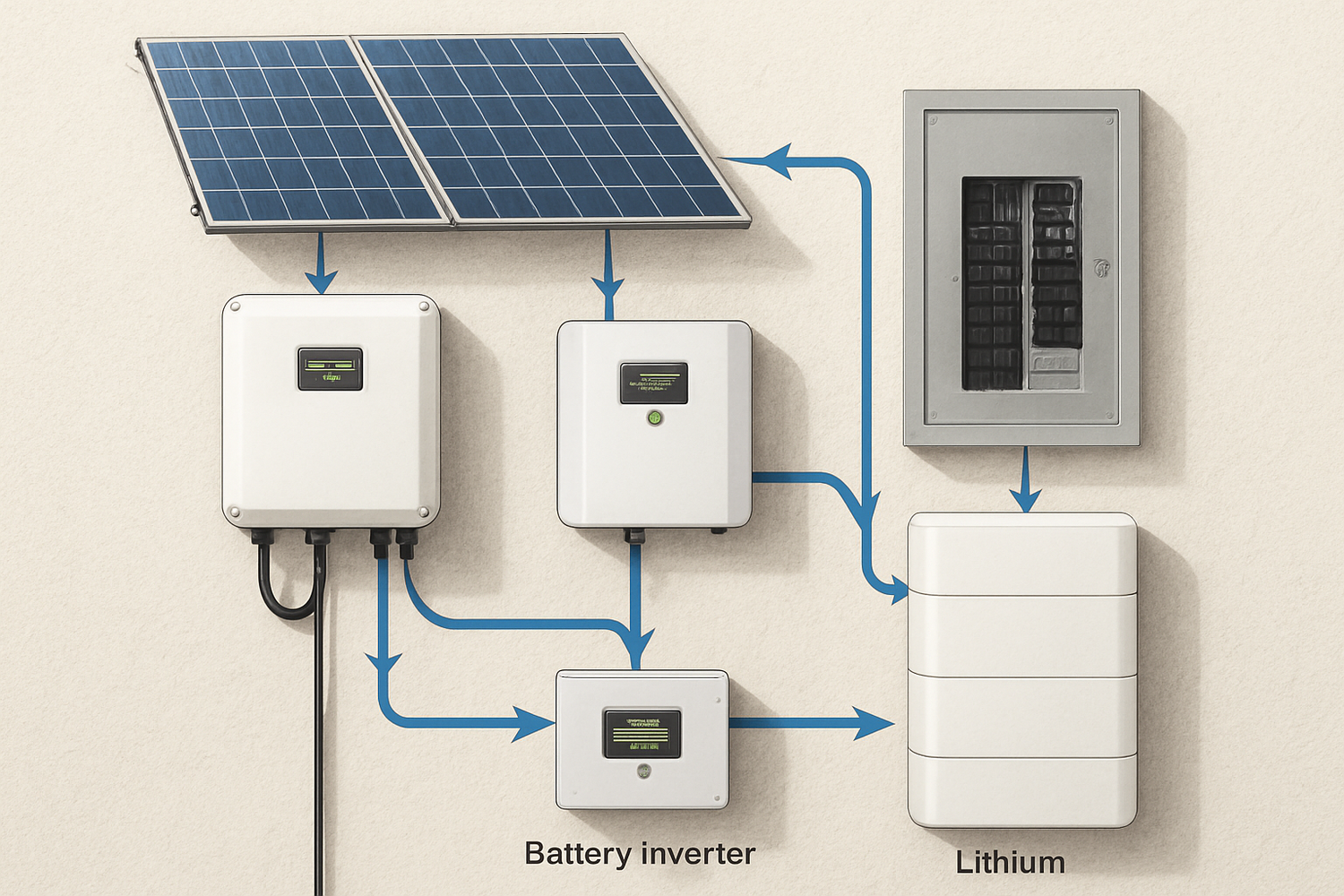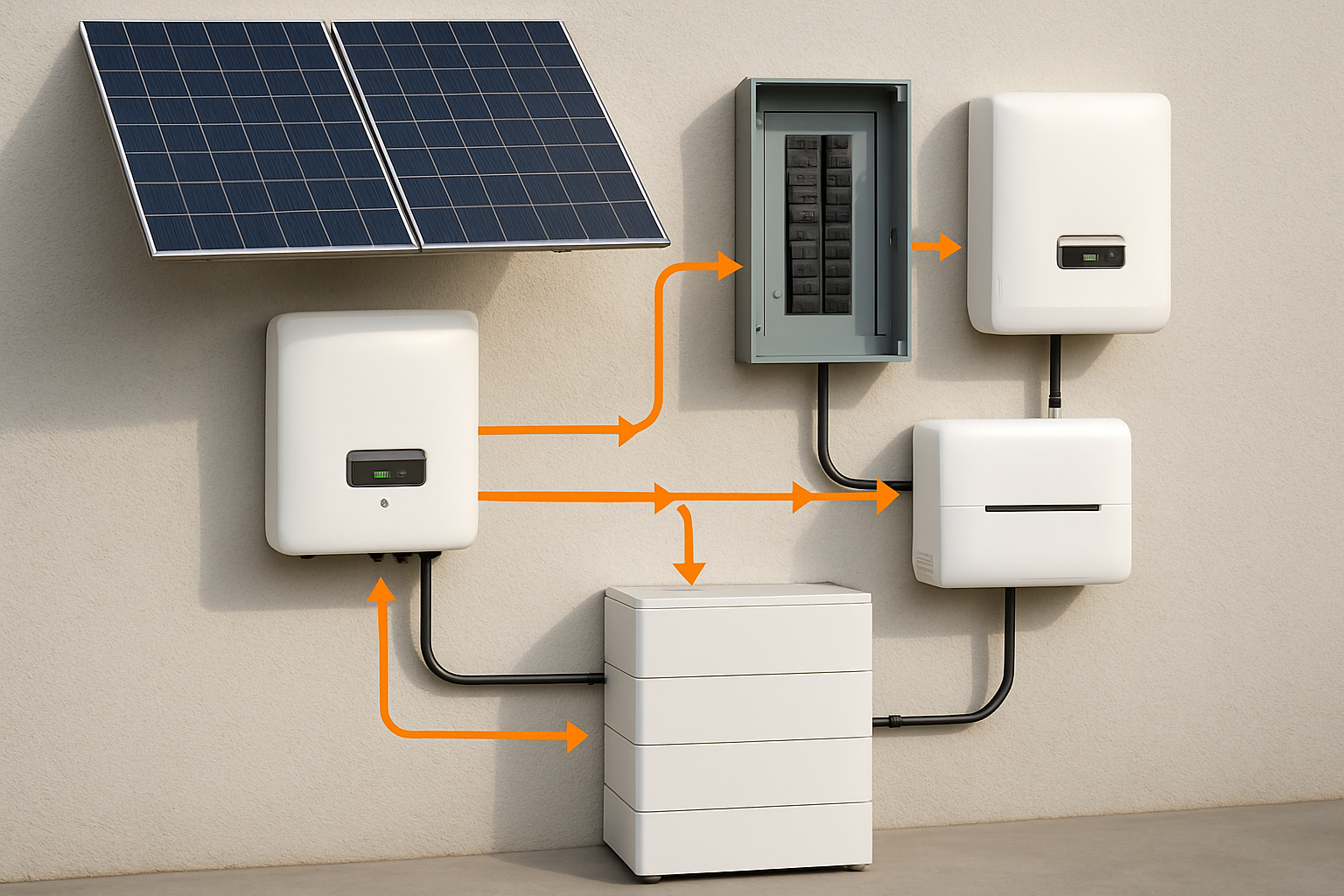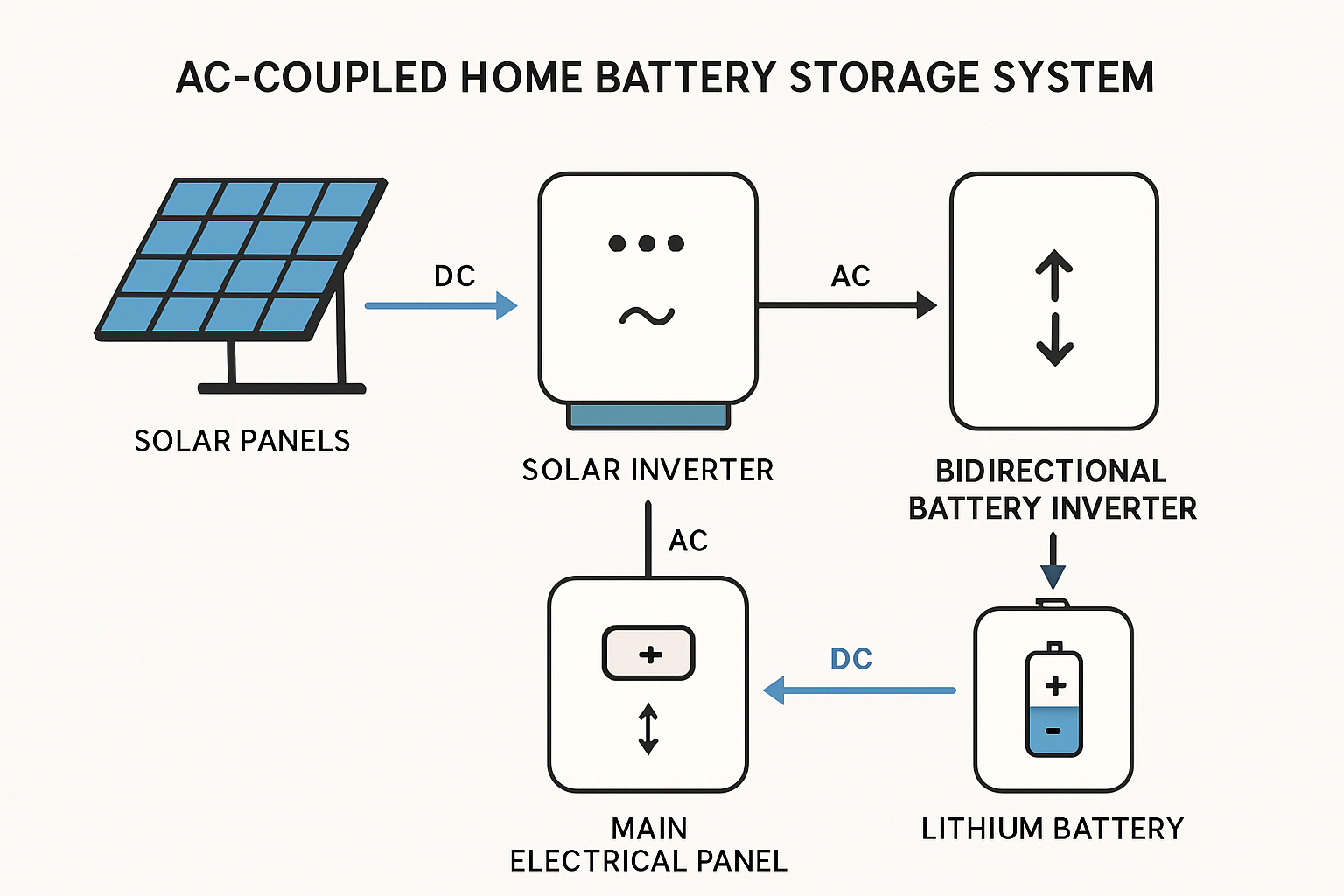As more households adopt solar power, the demand for effective energy storage solutions continues to rise. Storing excess solar energy generated during the day for use at night or during power outages is a key step toward energy independence. An AC coupled lithium battery storage system is a powerful and flexible way to add this capability, particularly for homes with an existing solar panel installation.
What is an AC Coupled Battery System?
An AC coupled battery system is designed to be added to an existing solar installation without requiring significant changes to the current setup. It works on the alternating current (AC) side of your home's electrical system, making it a versatile choice for retrofitting.
The Core Concept of AC Coupling
Solar panels naturally produce direct current (DC) electricity. In a typical grid-tied solar system, a solar inverter converts this DC power into AC power that your home can use. An AC coupled system adds a second, separate inverter—a battery inverter. This battery inverter takes the AC power from your electrical panel, converts it back to DC to charge the battery, and then converts it back to AC when your home needs to draw power from the battery. This design allows the battery system to operate independently of the solar panel system.
Key Components in the System
A complete AC coupled lithium battery storage setup includes several distinct components working together:
- Existing Solar Array and Inverter: Your current solar panels and the inverter that converts their DC output to AC.
- Battery Inverter/Charger: This is the core of the AC coupled system. It manages the flow of electricity to and from the battery, handling the AC-to-DC and DC-to-AC conversions.
- Lithium Battery: High-performance lithium-ion batteries, such as Lithium Iron Phosphate (LiFePO4), are used to store the energy. They are known for their long cycle life, safety, and reliability.
- Monitoring System: A smart monitoring system allows you to track energy production, battery charge levels, and household consumption in real-time, helping you optimize your energy use.
How AC Coupled Lithium Battery Systems Work
The functionality of an AC coupled system is best understood by looking at how it directs the flow of energy throughout the day. The system intelligently decides whether to power your home, charge the battery, or interact with the grid.
The Energy Flow Explained
During the day, the electricity generated by your solar panels first powers your home's appliances. If there is excess energy, it is directed to the battery inverter, converted to DC, and stored in the lithium battery. Once the battery is full, any additional surplus power can be exported to the grid. In the evening, when the solar panels are no longer producing, the battery inverter draws DC power from the battery, converts it to AC, and supplies your home's energy needs. If the battery becomes depleted, the system can draw power from the utility grid as a final backup.
Retrofitting an Existing Solar System
The primary advantage of AC coupling is its suitability for retrofits. Since the battery system is connected to the AC side of your electrical panel, it doesn't require altering the existing wiring of your solar array. This makes the installation process simpler, faster, and often more cost-effective for homeowners who already have solar panels. This modular approach provides flexibility and makes AC coupling a popular choice for upgrading to energy storage.
Advantages and Considerations of AC Coupling
While AC coupling offers significant benefits, it's also important to weigh its performance characteristics and sizing requirements to ensure it aligns with your energy goals.
Key Benefits
AC coupled systems provide several distinct advantages:
- Installation Simplicity: Ideal for adding storage to an existing solar system with minimal disruption.
- Universal Compatibility: Works with almost any existing grid-tied solar inverter, regardless of the brand.
- Scalability: You can easily add more battery capacity in the future without needing to overhaul your entire solar setup.
- Reliable Backup Power: When paired with the right inverter, an AC coupled system can provide seamless backup power to essential appliances during a grid outage.
Efficiency and Performance
The process of converting electricity multiple times (DC from panels to AC for the home, then AC back to DC for the battery, and finally DC back to AC for use) results in small energy losses at each step. This is known as 'round-trip efficiency'. AC coupled systems typically have a round-trip efficiency of 90-94%, slightly lower than their DC coupled counterparts which can reach up to 98%. However, overall system performance depends on more than just the coupling method. As explained in this ultimate reference on solar storage performance, the quality of the inverter and the chemistry of the lithium battery are also critical factors in maximizing your stored energy.
Sizing Your System Correctly
Properly sizing your AC coupled lithium battery system is crucial. The capacity of your battery (measured in kilowatt-hours, kWh) should be based on your nightly energy consumption and your goals for backup power. The power rating of the battery inverter (in kilowatts, kW) determines how many appliances you can run simultaneously. A thorough analysis of your electricity usage patterns will help determine the optimal size for your needs.
Comparing AC Coupled and DC Coupled Systems
The choice between an AC or DC coupled system largely depends on whether you are installing a new solar-plus-storage system or retrofitting an existing one.
| Feature | AC Coupled System | DC Coupled System |
|---|---|---|
| Best Use Case | Retrofitting existing solar systems | New solar and storage installations |
| Installation Complexity | Simpler for retrofits | More integrated for new builds |
| Efficiency | Slightly lower (90-94%) | Slightly higher (up to 98%) |
| System Components | Two inverters (solar and battery) | One hybrid inverter |
| Cost for Retrofit | Often more cost-effective | Can be more expensive due to rewiring |
A Forward-Looking Perspective
AC coupled lithium battery storage stands out as a practical and effective solution for homeowners looking to enhance their existing solar systems. It provides a straightforward path to greater energy self-sufficiency and resilience against grid instability. As the global energy landscape shifts, residential battery storage plays an increasingly vital role. According to the International Renewable Energy Agency (IRENA), electricity storage is critical for creating the flexibility needed to integrate higher shares of renewable energy into the grid. The International Energy Agency (IEA) reinforces this, stating that battery storage is the fastest-growing clean energy technology and is poised to play a critical role in secure energy transitions. By adopting solutions like AC coupled storage, homeowners not only reduce their electricity bills but also contribute to a more stable and sustainable energy future.
Frequently Asked Questions
Can I add an AC coupled battery to any solar panel system?
In most cases, yes. The primary benefit of AC coupling is its compatibility with nearly any existing grid-tied solar system, as it functions independently from your solar inverter.
Is an AC coupled system less efficient than a DC coupled system?
An AC coupled system may have a slightly lower round-trip efficiency due to the additional energy conversion steps. However, for many homeowners, especially those retrofitting, the ease of installation and flexibility often make it the more practical choice.
What size lithium battery do I need?
The ideal battery size is determined by your energy goals. You should consider whether you want to cover your evening energy consumption, provide backup for essential appliances, or achieve near-complete energy independence. Analyzing your daily energy usage is the first step to proper system sizing.
Do I need to replace my existing solar inverter?
No, you do not. An AC coupled system is designed to work alongside your current solar inverter by adding a separate battery inverter to manage the storage system.





Leave a comment
All comments are moderated before being published.
This site is protected by hCaptcha and the hCaptcha Privacy Policy and Terms of Service apply.